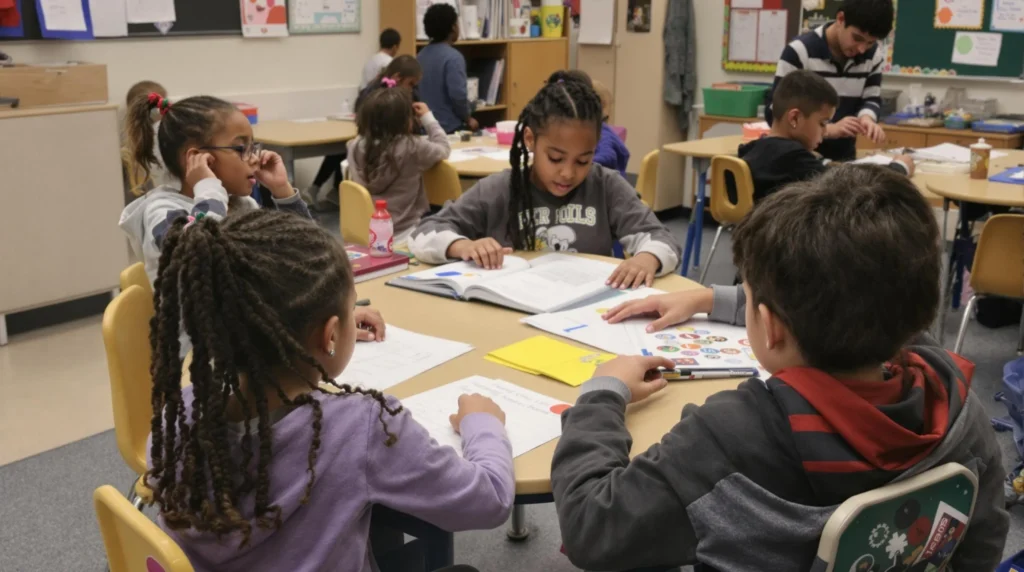Table of Contents
ToggleIn a world where toddlers can navigate tablets better than most adults, early childhood education centers are the unsung heroes shaping the future. These vibrant hubs of learning don’t just teach ABCs and 123s; they cultivate curiosity and creativity, preparing little ones for a lifetime of success. Who knew that finger painting could lead to future innovations?
Imagine a place where kids giggle while they learn, and every snack time is a mini science experiment. Early childhood education centers turn play into purpose, blending fun with foundational skills. It’s where social butterflies emerge and friendships bloom, all while parents enjoy a well-deserved coffee break. Investing in these centers means investing in a brighter, smarter future—one smile at a time.
Overview of Early Childhood Education Centers
Early childhood education centers focus on the developmental needs of children from birth to age eight. These centers provide structured environments where young children engage in learning through play. Children gain essential skills in language, literacy, and math while interacting with peers.
Enrollment in these programs promotes socialization and emotional development. Children learn to communicate effectively, share, and resolve conflicts with others. Parents often notice marked improvements in their children’s social skills after attending these centers.
Curriculum design typically integrates various activities that cater to different learning styles. These activities might include hands-on projects, music, and storytelling sessions. Children experience a blend of independent and group learning activities, which fosters collaboration and creativity.
Research indicates early childhood education significantly impacts long-term academic success. Students who attend quality programs often perform better in later grades. Additionally, early exposure to structured learning environments enhances critical thinking and problem-solving abilities.
Providers of early childhood education often maintain a focus on creating safe, nurturing spaces. Safety protocols and child-friendly facilities contribute to a supportive atmosphere for exploration. Educators receive specialized training to implement effective teaching methods that support each child’s unique development.
Community involvement is crucial for the success of these centers. Collaboration with families and local organizations strengthens the educational experience. Parents commonly participate in workshops and events that reinforce learning at home, solidifying the center’s connection to family life.
Benefits of Early Childhood Education
Early childhood education centers play a vital role in supporting children’s growth. These programs offer numerous advantages that extend beyond the classroom.
Cognitive Development
Cognitive development thrives in early childhood education settings. Children engage in various activities that stimulate their minds. Interactive learning experiences enhance critical thinking abilities while nurturing curiosity. Research shows that children in quality programs tend to perform better academically in later grades. Vocabulary acquisition occurs naturally as they participate in conversations with peers and educators. A focus on different learning styles ensures that every child benefits from personalized attention. The integration of play with structured tasks helps develop problem-solving skills.
Social Skills Enhancement
Social skills enhancement occurs as children interact with one another in a structured environment. Communication with peers fosters teamwork and collaboration. These interactions build confidence in expressing thoughts and feelings. Children learn to navigate relationships, which sets a foundation for future social interactions. Cooperation during group activities encourages sharing and taking turns. Furthermore, conflict resolution skills often develop through guided play, teaching children how to work through differences. Families notice improved social competence after their children participate in these engaging programs. These benefits contribute to well-rounded individuals equipped for future social scenarios.
Choosing the Right Early Childhood Education Center
Selecting an appropriate early childhood education center significantly influences a child’s development journey. Factors such as safety, curriculum quality, and educator qualifications play critical roles in this decision.
Factors to Consider
Safety standards rank among the highest priorities for parents. Examine the center’s security measures and cleanliness practices. Curriculum diversity presents another vital factor; a well-rounded program includes activities in literacy, math, and creative arts. Check for flexibility in learning styles that cater to individual needs. Furthermore, trained and caring educators enhance the educational experience by providing personalized attention. Community engagement strengthens the center’s resources, creating a supportive learning environment.
Questions to Ask
Inquire about educator qualifications and training during visits. Ask how the curriculum promotes both academic and social skills. Request information on safety protocols, including emergency procedures and health policies. Find out how parents are involved in the learning process through workshops or activities. Understand how the center tracks developmental progress, ensuring children meet essential milestones.
Curriculum and Teaching Methods
Early childhood education centers use diverse curricula and teaching methods to support children’s development. These approaches create an enriching environment that nurtures lifelong learning.
Play-Based Learning
Play-based learning serves as a cornerstone of early childhood education. Children engage with various materials while exploring ideas, concepts, and social interactions. This method fosters creativity and cognitive skills. Through imaginative play, children develop problem-solving skills and emotional intelligence. Educators utilize this learning style to build communication and collaboration among peers. Observations confirm that children exposed to play-based curricula enjoy increased engagement and motivation, reinforcing a love for learning.
Structured Learning Environments
Structured learning environments promote a balance between guided and independent exploration. As children transition through different activities, they gain new skills essential for their development. Utilizing a consistent routine helps children adapt to the learning process, creating a sense of security and focus. Activities encompass literacy, math, and the arts, ensuring well-rounded growth. Educators assess individual needs, adapting instructional strategies to support each child’s journey. This thoughtful approach fosters not only academic growth but also social and emotional health in young learners.
Investing in early childhood education centers is vital for nurturing the potential of young children. These centers create enriching environments that support not just academic growth but also social and emotional development. By focusing on play-based learning and individualized attention, they prepare children for future challenges.
Parents play an essential role in this journey, and their involvement enhances the experience for both children and educators. The choice of the right center can significantly impact a child’s trajectory. As communities recognize the importance of early education, they contribute to building a brighter future for everyone.






